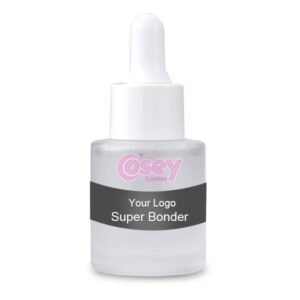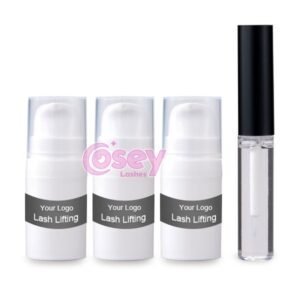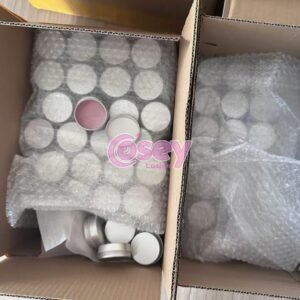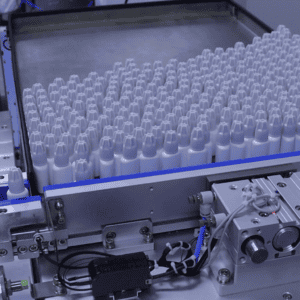Eyelash extension glue is essential for salon success, but do you know exactly what’s in it? Understanding the ingredients is key to ensuring safety and effectiveness. This guide will break down the functions of each ingredient in lash glue, helping you make better choices for your clients and business.
Eyelash extension glue typically contains key ingredients such as cyanoacrylate, which provides quick bonding, and polymers, which enhance the glue’s strength and longevity. Carbon black is used to add color in black glues, while hydroquinone stabilizes the formula to prevent premature curing. Understanding these ingredients ensures the glue works effectively and safely, giving you the best results for your clients.
Now, let’s dive into the specifics of each ingredient. From fast-drying cyanoacrylate to longevity-enhancing polymers, we’ll explore what each one brings to your lash extension products and how it affects your clients’ experience.
1- Cyanoacrylate – The Quick-Bonding Powerhouse
Function: Cyanoacrylate is the primary bonding agent in lash glue. It’s responsible for the glue’s fast-drying properties, forming a strong, long-lasting bond between the natural lashes and the extensions. Its rapid curing makes it ideal for professional lash artists who need quick and reliable results.
2-Polymethyl Methacrylate (PMMA) – Strengthening the Bond
Function: PMMA is a polymer that enhances the strength of the adhesive bond. When the glue is applied, PMMA hardens, ensuring the extensions stay in place for longer periods. This ingredient also contributes to the glue’s flexibility, allowing natural lash movement without damaging the extensions.
3-Carbon Black – Color for Black Glues
Function: Found only in black adhesives, carbon black gives lash glue its signature dark color. It’s especially useful for creating a seamless, natural look with black extensions, making the bond less noticeable.
4-Hydroquinone – Preventing Premature Curing
Function: Hydroquinone acts as a stabilizer in lash glue. It prevents the adhesive from curing inside the bottle by neutralizing free radicals. Without hydroquinone, the glue could harden prematurely, reducing its shelf life and effectiveness.
5-Polymers – Enhancing Texture and Longevity
Function: Polymers help thicken the glue, making it smoother and easier to apply. They also increase the glue’s durability, which is why glues with more polymers are often more expensive but last longer. Polymers contribute to the overall performance, ensuring that the extensions stay in place for extended periods.
FAQ: Eyelash Extension Glue Ingredients
1-What ingredients should you avoid in eyelash glue?
It’s important to avoid certain ingredients that can cause irritation or allergic reactions. These include Formaldehyde (a preservative), Latex (which can cause skin reactions), and Parabens (used as preservatives). Always check the label for these harmful ingredients or MSDS before choosing a glue.
2-Is eyelash extension glue safe for all clients?
While most eyelash extension glues are safe for general use, they may not be suitable for everyone. Clients with sensitive eyes or skin may need special formulations, such as without PMMA & Hydroquinone glue. Always perform a patch test to check for potential allergies before using any new product.
3-Do You Have PMMA-Free & Hydroquinone-Free Glue?
Yes, Cosey Lashes NC05 glue is PMMA-free and Hydroquinone-free, making it a safer option for people with sensitivities.
4-How long does eyelash extension glue last?
The longevity of eyelash extension glue depends on its ingredients and how well it bonds. Polymers in the glue contribute to a longer-lasting hold, with some professional glues lasting up to 6-8 weeks. Proper application and aftercare can also extend the life of the extensions.
5-Are Eyelash Extension Glues Formaldehyde-Free?
No, eyelash extension glues are not entirely formaldehyde-free. Formaldehyde is a by-product formed when the glue cures, not an active ingredient. While the small amounts released during a lash appointment are not harmful, prolonged exposure to large quantities could be problematic. For safety, ensure your workspace is well-ventilated, and consider wearing a respiratory mask if you’re sensitive to fumes.
6-Is Latex Used in Lash Glue?
Latex is used in some lash glues to improve resistance to oils and water, enhancing retention and durability. However, it can cause allergic reactions in some clients, even if they’re unaware of a latex allergy. To avoid this, many Cosey Lashes now use a synthetic rubber elastomer instead, which provides similar durability without the risk of latex reactions. All of Cosey Lashes glues are latex-free.







